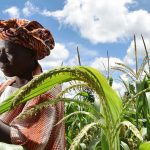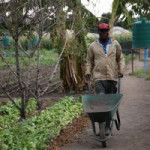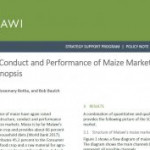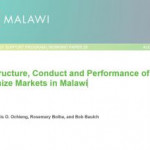This blog is based on a presentation by Dr Timothy Thomas, Senior Research Fellow, IFPRI presented during the 3rd joint national annual research symposium on ‘Inclusive and Sustainable Economic Development – Envisioning Wealth for all’, which took place on September 18-19, 2019 in Lilongwe, Malawi. The research symposium was opened by the Chief Secretary to >> Read more Source: Malawi Strategy Support Program
Effect of changes in population density and crop productivity on farm households in Malawi
A new open access article by Adam M. Komarek and Siwa Msangi, first published on August 16, 2019 in Agricultural Economics, examines the ex-ante farm-household effects of changes in family size, yield potential, and yield gaps using a farm-household simulation model that reflects the economic and biophysical conditions of central Malawi. The study, conducted in >> Read more Source: Malawi Strategy Support Program
Policy Note 35: Structure, Conduct and Performance of Maize Markets in Malawi: Synopsis
This Policy Note offers a synopsis of a study, detailed in Working Paper 29, which analyzed the structure, conduct and performance of maize markets in Malawi during the 2018/2019 main harvest and lean seasons. The study team interviewed 749 traders from 74 markets across 8 districts and held 28 focus group discussions with a total >> Read more Source: Malawi Strategy Support Program
Working Paper 29: Structure, Conduct and Performance of Maize Markets in Malawi
Recent rises in the price of maize have again raised questions about the structure, conduct and performance of Malawi’s maize markets. Maize is by far Malawi’s most important staple crop and contributes about 66 percent of calories to typical household diets. The crop, which contributes 45.2 percent to the Consumer Price Index, is both a >> Read more Source: Malawi Strategy Support Program
Working Paper 28: Nutrient and mycotoxin content of commercially-sold premixed infant cereals in Malawi
Working Paper 28 explores the quality of premixed cereals sold for infant feeding in Malawi in a multifaceted way, assessing nutrient adequacy, mycotoxin contamination, and labeling accuracy. Fortified premixed cereals can help caregivers meet infants’ nutrient needs, when used to complement continued breastfeeding alongside the gradual introduction of nutrient-dense family foods. While these cereals are >> Read more Source: Malawi Strategy Support Program
- « Previous Page
- 1
- …
- 48
- 49
- 50
- 51
- 52
- …
- 55
- Next Page »




